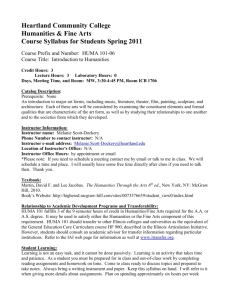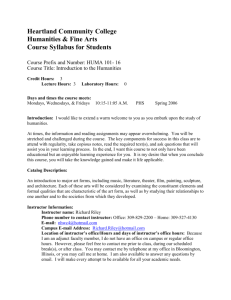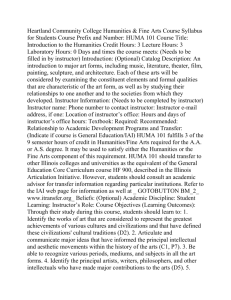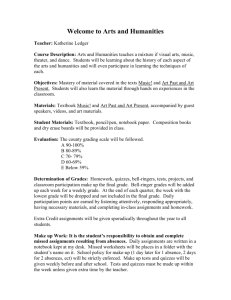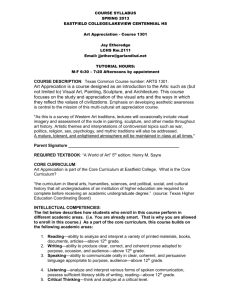HUMA 101-09 Scott-Dockery
advertisement
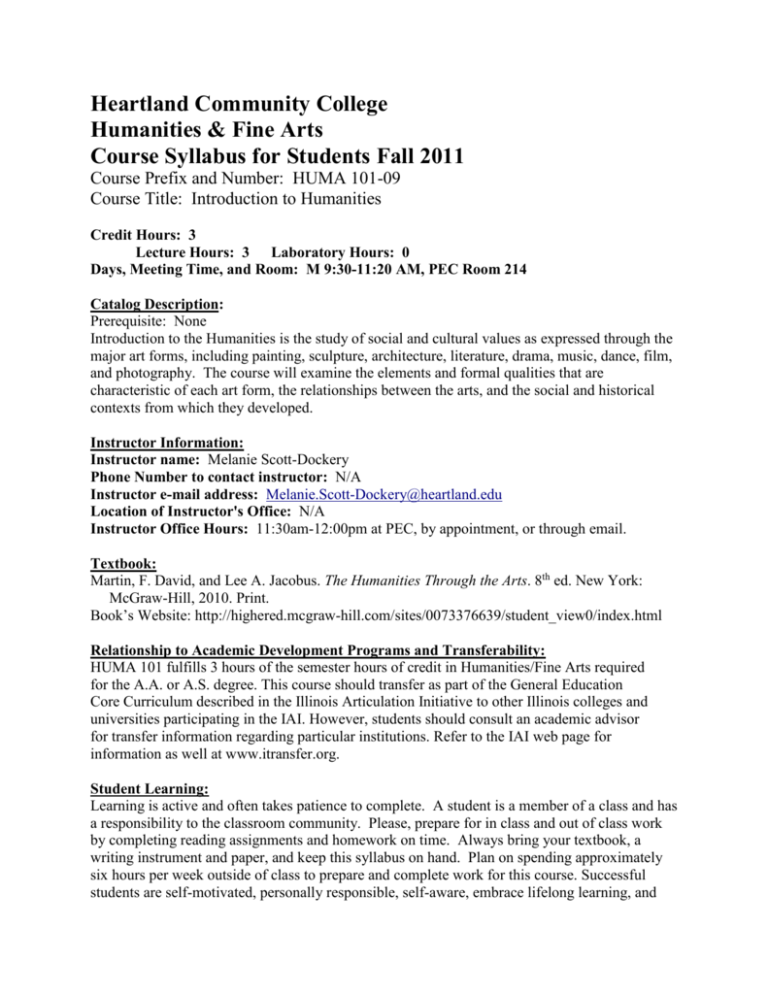
Heartland Community College Humanities & Fine Arts Course Syllabus for Students Fall 2011 Course Prefix and Number: HUMA 101-09 Course Title: Introduction to Humanities Credit Hours: 3 Lecture Hours: 3 Laboratory Hours: 0 Days, Meeting Time, and Room: M 9:30-11:20 AM, PEC Room 214 Catalog Description: Prerequisite: None Introduction to the Humanities is the study of social and cultural values as expressed through the major art forms, including painting, sculpture, architecture, literature, drama, music, dance, film, and photography. The course will examine the elements and formal qualities that are characteristic of each art form, the relationships between the arts, and the social and historical contexts from which they developed. Instructor Information: Instructor name: Melanie Scott-Dockery Phone Number to contact instructor: N/A Instructor e-mail address: Melanie.Scott-Dockery@heartland.edu Location of Instructor's Office: N/A Instructor Office Hours: 11:30am-12:00pm at PEC, by appointment, or through email. Textbook: Martin, F. David, and Lee A. Jacobus. The Humanities Through the Arts. 8th ed. New York: McGraw-Hill, 2010. Print. Book’s Website: http://highered.mcgraw-hill.com/sites/0073376639/student_view0/index.html Relationship to Academic Development Programs and Transferability: HUMA 101 fulfills 3 hours of the semester hours of credit in Humanities/Fine Arts required for the A.A. or A.S. degree. This course should transfer as part of the General Education Core Curriculum described in the Illinois Articulation Initiative to other Illinois colleges and universities participating in the IAI. However, students should consult an academic advisor for transfer information regarding particular institutions. Refer to the IAI web page for information as well at www.itransfer.org. Student Learning: Learning is active and often takes patience to complete. A student is a member of a class and has a responsibility to the classroom community. Please, prepare for in class and out of class work by completing reading assignments and homework on time. Always bring your textbook, a writing instrument and paper, and keep this syllabus on hand. Plan on spending approximately six hours per week outside of class to prepare and complete work for this course. Successful students are self-motivated, personally responsible, self-aware, embrace lifelong learning, and believe in themselves. You do not have to tackle this class on your own, ask questions and request assistance when needed. We all need help sometimes. Instructor’s Role: First of all, know that if you have any questions about the class or problems with assignments contact me. This includes difficulty understanding the material as well as tackling the workload. The best way is after class or through email. I check messages at least every other day. If you contact me with a problem I will respond as soon as possible to resolve the issue. I am here to challenge and assist you in learning art theory and culture. To fully challenge you, I will sometimes challenge your assumptions about art, and to assist you I will honestly evaluate your performance. We are embarking on the exciting journey of studying humanity, I am your guide on this tour. Warning: when traveling I sometimes enjoy being lost to discover something new and unexpected. So far I have always found my way home. Course Objectives (Learning Outcomes) Course Outcomes General Range of Assessment Methods Education Outcomes Display understanding of the role of the arts and DI3 Class discussion, In-class activities, humanities in society, as well as in one's own life. Writing assignments Analyze works in the arts and humanities as Class discussion, In-class activities, products of a particular sociocultural framework. Exams Demonstrate the ability to appreciate and utilize CO1 Writing assignments, Quizzes, Exams the processes of criticism and evaluation as useful heuristics (exploratory problem-solving techniques that utilize self-educating techniques.) Demonstrate awareness and appreciation of the DI5 Class discussion, Writing assignments extent and impact of cultural diversity in our society as reflected in the arts and humanities. DI4 Become aware of how themes we find in the Class discussion, In-class activities, arts and humanities relate to contemporary Writing assignments worldwide issues. Interact with other individuals and in groups to PS4 Class discussion, In-class activities, come to a consensus about an issue in the Writing assignments humanities and how to approach it productively. Identify appropriate topics for scholarly research CT2 Writing assignments in the arts and humanities, utilize standard bibliographic and other research tools, select suitable sources and methodology, and write papers presenting the results of their research while observing the conventions of scholarly discourse. CO1 (Communications Outcome 1): “Students compose a message and provide ideas and information suitable to the topic, purpose, and audience.” DI3 (Diversity Outcome 3): “Students reflect upon the formation of their own perspectives, beliefs, opinions, attitudes, ideals, and values.” DI4 (Diversity Outcome 4): “Students explain the contributions of diverse perspectives to the development of various fields of inquiry and to society as a whole, and re-examine their own values and beliefs in light of the insights they have gained from their study of other cultures.” DI5 (Diversity Outcome 5): “Students consistently and characteristically approach diversity issues in a manner that exemplifies respect for and appreciation of difference.” PS4 (Problem Solving Outcome 4): “Student analyzes the situation, explores different outcomes from multiple frameworks, applies the appropriate solution, analyzes the results, and refines the solution.” CT2 (Critical Thinking Outcome 2): “Students determine value of multiple sources or strategies and select those most appropriate in a given context.” Course/Lab Outline: Cultural Contexts of the Humanities Defining & Evaluating Art Painting Sculpture Architecture Literature Drama Music Dance Film Photography Their Interrelationships of the Arts The Role of Humanities & the Arts in Society Method of Instruction: Instruction may take any or all of these forms class discussions and projects, demonstrations, fieldtrips, individual and small-group projects, and lectures. Blackboard Supplement: You will find a copy of the syllabus, class guides, journal entries, assignments, and grades recorded in Blackboard. However, please send messages to me through email rather than the Blackboard message system. I will check email messages on a regular basis, but not Blackboard messages. Course Policies: Method of Evaluation (Tests/Exams, Grading System): 25% (200 points) 20% (160 points) 30% (240 points) 25% (200 points) Total = 800 points 4 Objective Tests 1 Final Exam Journal (120), Draft and Final Version of Research Paper (120) Other classroom assignments: Outlines (100) and Presentation (100) Grading Scale: 92 to 100% = A (736-800 points) 83 to 91% = B (664-735 points) 74 to 82% = C (592-663 points) 65 to 73% = D (520-591 points) Below 65% = F (519 points and below) Specifications for Written and Other Assignments: Use MLA (Modern Language Association) formatting. Refer to OWL at Purdue for guidance (http://owl.english.purdue.edu/), pick up a guide at the HCC library, or contact a representative of HCC’s Writing Center. Please ask if you have any questions. Please let your reader (usually me) know from where you retrieve information. If you cite quotes or ideas from any sources, include a works cited page. Grammatical errors and misspellings will affect grades so use spell check and proofread. Do not use websites for reference unless the site is created by a professional in the field of art or humanities, for example, a museum. Use sources that will give you accurate and good information. The HCC library has a great handout on evaluating sources. Please punctuate titles of artworks. Sometimes this calls for italics and sometimes apostrophes. Do not use Wikipedia as a source. You can use it as a reference to get started, but you cannot trust the information on Wikipedia because it is user driven. That means those creating the content are not always experts in the field of art and culture. Incompletes Policy: If you are struggling or foresee a complication in completing this course contact me as soon as possible. It is best to avoid an incomplete. In the event of an emergency, I will assess whether or not an incomplete would be helpful to your education endeavors. Also, I will only consider granting an incomplete if your work, class participation, and attendance has been good to date. Deadlines and Make-up Work: I will not accept late work. I will drop your lowest test grade (excluding the final exam), outline grade, and journal grade. The final exam, draft of research paper, research paper, and research group presentation cannot be made up, these must be completed on time. Please plan ahead and talk to me if you are having problems keeping up. Extra Credit: Depending on class progress, I may offer the class an opportunity to earn extra points. I will announce this to the entire class when appropriate. I do not always give extra credit. I use it if it is going to enhance the learning experience. W at Midterm: I reserve the right to withdraw any student not progressing towards completion of the class when midterm grades are recorded. If you have questions about this please ask. Attendance Policy: You should only miss class if absolutely necessary, in the case of an emergency or illness. If you have two absences you are required to meet with me before returning to class. Please show up early when returning. If we do not have time to talk then we will meet after class that day. We will discuss the reasons for your absence, how well you are keeping up with the homework, and whether or not it will be possible for you to complete the course. Please note: If you arrive late or leave early more than once, it will be counted as an absence. Required Writing and Reading: Required reading will include approximately 45-50 pages per week, both from the required text and from other sources relevant to the arts and the humanities. Students will write the equivalent of 12-15 pages of writing (researched-based and/or response) throughout the semester. Student Conduct: Please display courteous behavior while in class. Do not make noise or talk while someone else is addressing the class. Put your cell phone and/or other electronic devices away when class begins, unless otherwise directed for an assignment. Keep your focus on the topics at hand and use the time in HUMA 101-09 for work in that class. Arriving late or leaving early is disruptive to the classroom environment so please do not do it (see above for absence policy). A copy of HCC’s Student Code of Conduct from the 2010-12 catalog is copied at the end of this syllabus. If you are disruptive to the learning environment I will ask you to leave the classroom, and you may be counted absent for the day. Notice of Cancelled Class Sessions: Cancelled class sessions, for all HCC classes, will be listed under Cancelled Class Meetings in the A-Z Index and under Academic Information in the Current Students page on the HCC Web site. Go to http://www.heartland.edu/classCancellations/ to learn what classes have been cancelled for that day and the upcoming week. Be sure to check the last column, which might contain a message from the instructor. Also, logging on to myheartland displays cancelled class information. Additional Information about Heartland Community College: Disability Support Services Heartland Community College offers Disability Support Services (DSS) with offices located in the Academic Support Center. DSS ensures that students with disabilities have equal access to the college’s programs, services and activities through the provision of reasonable accommodations as outlined in Section 504 of the Rehabilitation Act and the Americans with Disabilities Act. DSS offers a wide range of services to support students with disabilities, including: assistive technology, document conversion services, personnel, classroom and testing accommodations. Students with a documented disability who wish to discuss academic accommodations can contact disability support services at (309)268-8259. Academic Integrity Academic integrity is a fundamental principle of collegial life at Heartland Community College and is essential to the credibility of the College’s educational programs. Moreover, because grading may be competitive, students who misrepresent their academic work violate the right of their fellow students. The College, therefore, views any act of academic dishonest as a serious offense requiring disciplinary measures, including course failure, suspension, and even expulsion from the College. In addition, an act of academic dishonesty may have unforeseen effects far beyond any officially imposed penalties. Violations of academic integrity include, but are not limited to cheating, aiding or suborning cheating or other acts of academic dishonesty, plagiarism, misrepresentation of data, falsification of academic records or documents and unauthorized access to computerized academic or administrative records or systems. Definitions of these violations may be found in the college catalog. Plagiarism Plagiarism is the presenting of others’ ideas as if they were your own. When you write a paper, create a project, do a presentation or create anything original, it is assumed that all the work, except for that which is attributed to another author or creator, is your own. Plagiarism is considered a serious academic offense and may take the following forms: • Copying word-for-word from another source and not giving that source credit. • Paraphrasing the work of another and not giving that source credit. • Adopting a particularly apt phrase as your own. • Using an image or a copy of an image without crediting its source. • Paraphrasing someone else’s line of thinking in the development of a topic as if it were your own. • Receiving excessive help from a friend or elsewhere, or using another project as if it were your own. [Adapted from the Modern Language Association’s MLA Handbook for Writers of Research Papers. New York: MLA, 1995: 26] Plagiarism, Specifics for HUMA 101-09 Fall 2011: Most cases of plagiarism arise from carelessness or haste. Violators often attempt to excuse themselves by saying that they were not told of the nature of plagiarism. Consider with notification. You must not include either the phrases or ideas of another in your papers without acknowledgment. Please inform your reader from where the information you are using comes. Don’t be afraid of citing sources which are not books. You can cite everything – including pamphlets, maps, cereal boxes, telephone conversations, movies, television shows, interviews, and world-wide web sites. If I discover a case of plagiarism in this class I will take into account the nature of the offense. The student may be asked to redo an assignment, may fail that assignment, or may fail the class depending on the severity of the offense. Take your time and when in doubt cite your source and you will be okay. On-Line Course Evaluations On-line course evaluations are completed by selecting the link in your myHeartland account. Philosophy of Grades The Heartland Community College grading philosophy grows out of our vision of educational excellence. This common philosophy provides a framework for each academic division and instructor as they establish their own individual course grading system, evaluation methods, and course policies using the shared general rubrics for letter grades given below. Letter grades serve as a vehicle to promote meaningful evaluation of student achievement, to inform students of academic progress, and, as necessary, to improve student performance, habits, and practices. Using a letter grade as a prerequisite for subsequent courses means we believe that the grade was assigned through a conscious judgment about a student’s readiness to proceed to more advanced study. At Heartland, students’ academic achievement is measured by their mastery of course objectives and content. We challenge students to meet these recognized standards of achievement and we assign grades based on their success in doing so. Simply stated, we believe that the responsibility for academic achievement rests with the student and that holding students responsible for their learning promotes their academic growth. Letter Grade Rubrics “A” This grade represents consistently outstanding performance that demonstrates superior understanding and skillful use of important course concepts. Performance at this level signifies that the student is extremely well prepared to continue with more advanced study of the subject. “B” This grade represents performance significantly beyond the level necessary to achieve the course objectives. Work is of high quality but not consistently at an outstanding level. Performance at this level signifies that the student is well prepared to continue with more advanced study of the subject. “C” This grade represents an acceptable achievement of the course objectives. Performance at this level signifies that the student is reasonably well prepared to continue with more advanced study of the subject. “D” This grade represents less than adequate performance. It signifies questionable readiness to proceed with more advanced study of the subject. “F” This grade reflects unacceptable performance. The student is not yet ready to proceed with more advanced study of the subject, and must repeat the course successfully to receive credit. Syllabi disclaimer: If the need arises, because of College closings; severe weather; class progress, or other unforeseen circumstances changes may be made to this syllabus and/or course calendar. The class will be notified of changes at the earliest possible time. Course Calendar: Day Homework: Reading and Assignments to do Before Class 8/22 8/29 Chapter 2 and Outline 9/5 9/12 9/19 9/26 10/3 10/10 Work Done in Class Blackboard Classwork Review Syllabus, Chapter 1, Outline, and Research Topics Before and After: Reflections on Guernica Chapter 2 Lichtenstein – Comics to art Finding great research sources Labor Day Continued: Guernia and choose topic of interest for research Chapter 3 and Outline Chapter 3 Further discussion of formcontent relationships Begin a critique of a work Study for Test #1 (First) Test #1 (Chap 1,2,3) Chapter 14 and Outline (Second) Chapter 14 Art and Idea Pop and popular art Parts of Chapter 15 and 16 Chapter 15 and 16 and Outline sections Interrelationships, Eakins, and Dewey Chapter 4 and Outline Chapter 4 Perspective, History, Culture Impressionism Study for Test #2 (First) Test #2 (14, 15, 16, 4) Chapter 5 and Outline (Second) Chapter 5 How do the topics in your group fit together? Through idea? Chronologically?... To what artists or works of art does your research topic relate? Influences on Impressionism What media does your research topic use, and what are the key words to describe that media? Chapter 6 Research sources Function and Form in Buildings revisited and organized Chapter 7 A short narrative about Poetry your research topic (First) Test #3 (5, 6, 7) Draft of research paper (Second) Research Group Minimum 4 pages Meetings Research Group Work and Self evaluation of paper review of papers 10/17 Chapter 6 and Outline 10/24 Chapter 7 and Outline 10/31 Study for Test #3 Work on Research Paper 11/7 Draft of Research Paper due at the beginning of class Sections of Drama, Music, Beethoven, Stravinsky, Cage, Dance and Outline and others Sections 11/14 Refine research topic and what makes a great research source What is the subject matter? How does the artist use artistic form to create content? Finish critique of a work by your research topic Journal: TBA 11/21 11/28 Study for Test #4 (First) Test #4 (Second)Practice Group Presentations Research papers due at the Group Presentations beginning of class 12/5 12/12 8-9:50am Group Presentations and Final Review Final Exam Finish Research Paper Self-eval of presentations Self-eval of presentations Code of Conduct Heartland Community College recognizes its students as both citizens and members of the academic community. As citizens, students have freedom of speech, assembly, association and press and the rights of petition and due process as guaranteed by the state and federal constitutions. As members of the academic community, students have the right and responsibility to participate in formulating and reviewing all College regulations and policies directly affecting them. Upon enrolling at HCC, each student assumes an obligation to act in accordance with generally acceptable standards of responsible adult behavior, which include respect of other students and other members of the College community. If this obligation is neglected or ignored, the College must take appropriate disciplinary action in order to function effectively. Upon committing or attempting to commit any act of misconduct on the College campus, whether in class, at an activity, function or event sponsored or supervised by the College, or elsewhere with a direct relationship between such act and the College, a student may be subject to disciplinary action. Acts of misconduct include, but are not limited to: 1. Academic dishonesty, such as cheating, plagiarism, etc.; 2. Knowingly furnishing false information to the College; 3. Forgery, alteration or any misuse of College documents and records; 4. Conduct which significantly interferes with the College’s teaching, administration or other responsibilities; 5. Conduct which endangers the health, safety or well-being of members of the College community or visitors to the campus, including but not limited to, unauthorized and/or illegal possession, use or distribution of controlled substances, look-alike drugs, alcohol or unauthorized/illegal use or possession of firearms or any other weapon; 6. Violation of specific College rules and regulations, including those regarding campus parking, equipment, facilities and telecommunications/Internet; 7. Failure to comply with directions of College officials acting within the scope of their duties; 8. Any conduct which constitutes a violation of a federal, state or local law. College officials will cooperate with federal, state and local authorities in any investigation of such violations. Students remain subject to federal, state and local laws; violation of these laws may lead to prosecution by agencies or persons, in addition to disciplinary action of the College.
